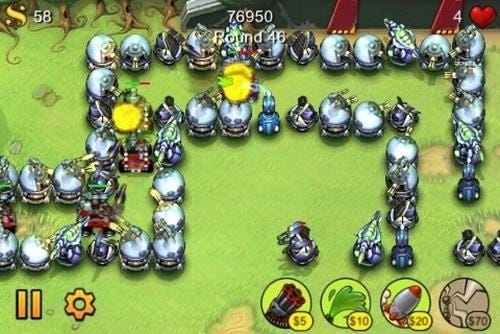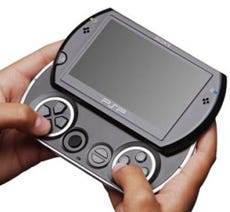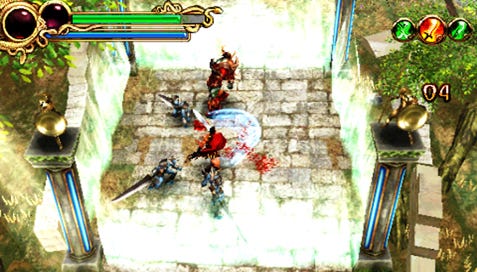Trending
Opinion: How will Project 2025 impact game developers?
The Heritage Foundation's manifesto for the possible next administration could do great harm to many, including large portions of the game development community.
It's the era of the small-app game, and we look closely at the strategy of Sony's PSP Minis, the developers behind it, the program's goals -- and its caveats.
October 5, 2009

Author: by Allen Rausch
They're little things. They're less than 100MB, they're available for download at attractive price points, and they bring all sorts of compelling gaming fun to a small black screen. For most people that describes the wonderful world of iPhone apps, little programs that have launched Apple's iPhone and iPod Touch from clever concepts to the new must-have gadget of the early 21st century.
Of the thousands of iPhone applications that have been launched since the system first started letting hobbyist programmers with a keyboard and a dream offer their wares to the world; it's the games that have become the killer app for the platform. Indeed, games have become so much a part of the system' strategy for Apple that its marketing (particularly for the Touch) now clearly emphasizes the system's gaming selection.
In a recent New York Times interview, Steve Jobs himself confirmed that the Touch was being repositioned as a gaming machine to compete with Nintendo's DSi and Sony's new digital distribution-only PSP Go. This is not a challenge that Sony can afford to ignore if it hopes to be competitive in the handheld space.
Their answer is the PSP Minis line of video games -- smaller PSP-compatible game titles that are digital only, have less stringent approval processes, and live in a separately branded part of the PlayStation Store for PSP.
The games are available to anyone who connects to PlayStation Store on the PS3 or those with earlier PSPs who have downloaded the OS update that allows for direct PlayStation Store browsing, meaning that a larger audience that just PGP Go is targeted. Launch titles for PSP Minis include games like Subatomic Studios' Fieldrunners, Digital Eel's BrainPipe and EA's Tetris and Sudoku, all retailing for between $5 and $10.
Looking particularly at the redesigned PSP Go, which was released globally last week, and the competitive environment it's launching into, PSP Minis appear to be an interesting angle. With the system completely dependent on downloadable titles from the online Sony Store and facing a competitor blessed by legions of hobbyist programmers, it only makes sense that Sony would be looking for a way to get as many apps into the hands of its users as quickly as possible.
As such, the company took a new approach when designing the development pipeline for the Minis. "Earlier this year we announced a reduction in the price of our SDK," said Eric Lempel, Sony's director of Playstation Network Operations and Strategic Planning. "With that and a redesigned development program, we wanted to lower the barrier to entry for smaller developers."
In some respects, the company has certainly lived up to its promise. The evaluation and approval process is extremely streamlined. Just about anyone can apply for an initial concept approval via the web and be reasonably sure of getting it.
In fact, the company has offered access to technical support even before the purchase of a dev kit in order to encourage fully specced out proposals. "We're really looking to offer some creative freedom here," Lempel said. "There's an experimental quality to Minis that we want to encourage. I think we'll be seeing some really exciting new things come out of it."

Fieldrunners
Once approved, development itself is as quick as the developers themselves can manage. The minis will not need stage one or stage two approval rounds, as typical in full PSP development; instead, they merely require what Lempel calls a "light QA phase" designed to screen for content and check for bugs.
Of course a shortened development process necessarily brings up the question of how Sony's planning on keeping the quality of the Minis above a certain standard (something Apple doesn't do, but which Sony has traditionally done with its consoles.)
Said Lempel, "Part of it is the selection process. We're looking to lower the barriers to entry, not remove them. We don't want 25,000 Minis on the system if 24,000 are just poor-quality clones of the same four games. Even at the reduced price, purchasing an SDK and needing to pay for an ESRB rating speaks to dedication and a developer's commitment to a certain level of quality."
Even so, Lempel is aware that not all Minis will be gems. "You're going to get some Minis that will be fantastic and some that will be less so. That's just the nature of the business. Any gaming channel you'd care to name has its great products and some that are not so great."
Sony is also banking on its experience as a gaming company with a well-established developer relations network to offer an advantage that Apple can't match. At least one developer sees this as significant. "I love the people at Apple, don't get me wrong," said Scott Tannen, president of Flash game portal and iPhone developer Candystand, now also working on PSP Mini titles.
"But our relationship with Sony is completely different... They're getting out there and actively supporting Mini titles at launch. They're getting skin in the game and it's that partnership aspect that makes working with them very attractive."
The once Wrigley-owned casual games portal, perhaps best known for Vector Tower Defense, has been in the business of creating swiftly playable casual titles for a dozen years.
According to Tannen, "We weren't really sure what to expect when we started working with Sony but they've more than exceeded any reasonable expectations. They've been extremely supportive at all levels of the process."
Other early developers present a more balanced view of the process. Subatomic Studios' Sergei Gourski (Fieldrunners) commented: "Developing for the PSP is definitely more serious business and not for casual non-developers."
"Having game development experience is a must. You have to invest some money into development kits and into getting ratings for your game. The costs of ratings such us ESRB is significantly more then we had realized."
Even with the early enthusiasm from some developers, the jury is still out on the Mini program, however. The program has received some criticism for a series of restrictions that may serve to blunt developer creativity and restrict the market.
 Minis are restricted to a hard limit of 100 MB of storage or less. They can also have no multiplayer capabilities or downloadable content.
Minis are restricted to a hard limit of 100 MB of storage or less. They can also have no multiplayer capabilities or downloadable content.
This is a restriction that pushed Square Enix's PSP Go launch title, Thexder Neo, out of the Mini classification and into a somewhat non-defined land between Mini and full retail game, despite only costing $9.99. (The game lives in the 'downloadable PSP game' section of the store, alongside titles formerly released at retail.)
There are a number of other larger titles that skirt this line. One of the biggest launch day PSP Go digital titles, Q-Games' PixelJunk Monsters Deluxe, which retails for $19.99, is listed alongside other bigger titles such as Gran Turismo PSP and even God Of War: Chains Of Olympus in the week's line-up, and also lives outside PSP Minis, due to enhanced feature set and pricing.
But according to Lempel, the carefully defined Minis subcategory is primarily to keep the development process nice and fast -- plus accessible to smaller developers. "Multiplayer adds a lot to the time needed for approval, to say nothing of the expense." he said.
"That's not to say we won't lift those restrictions in the future but as it stands it just doesn't fit into the vision of the program. We fully expect plenty of robust single-player experiences."
Of course, Candystand and similar companies are used to working within such tight timeframes and restrictions. "The console space and the free-to-play market we usually work in don't actually have a lot of commonality because of what we call 'churn and burn'," Tannen said. "We need to produce a couple of games a month that have to be five meg or less. For us, 100 MB seems like a ton of room."
As rosy as the PSP Go landscape looks for Candystand's Tannen and his brethren, the ultimate end-goal for Sony itself is harder to divine. While larger companies can and almost surely will produce Minis, the right strategy to make them profitable with the high overheads of a major publisher may be elusive.
Far from being a bug though, Sony in the person of Eric Lempel views it as a feature. "Minis aren't our only focus," Lempel said. "We've been in this business for 15 years and we view the PSP Go and the Minis as a gaming platform like any other we offer. There are different levels of gaming that depend on the kind of experience the gamer is looking for. There are big robust experiences that we'll continue to deliver, smaller but still deep games on the handheld and the quick hit five-minute pick-up-and-play stuff."
In fact, when asked, Lempel confirmed that there are no plans to offer non-gaming Minis such as a Twitter or Facebook application. The company is apparently not interested in turning the Go into an iPhone knockoff.
"In a lot of ways, Minis are just another gaming distribution channel and we need to support them that way," Lempel said. "Given their small size, they probably won't get their own marketing budget and we have no plans to market any specific programs, but we will get behind titles from a PR perspective."
"We'll take advantage of any sort of viral or electronic marketing and of course, we're always available to support the developer's own marketing efforts in any way we can."
According to Lempel, the biggest marketing push that Minis have is merely having their own dedicated area within the Playstation store. The company is planning on being very aggressive in merchandising titles and plans on regular internal merchandise evaluations for the section.
With a large bulk of PSP games -- most of them formerly on UMD, some at significantly reduced prices, and a few of them higher-profile digital exclusives -- flooding onto the PlayStation Store right now, it'll be interesting to see how Minis differentiate themselves over time, though.
As previously mentioned, there were over 100 PSP games made newly available on the Store in the past week, the vast majority older games. With such a big and impressive back catalog, some at $10 or less, will the $5-$10 PSP Minis stand out?
Subatomic's Gourski is certainly a little concerned that they might get lost in the shuffle, noting: "SCEA had not even announced or put up any links to the Minis channel on the day of the release -- not on the Store front, nor on the news page inside the PSP store. Which makes me wonder..."

Hero of Sparta
In the end, the upside of Sony's Mini strategy for developers is that there should be less competition than the iPhone, but a reasonably low barrier to entry -- plus an opportunity to reach older PSP owners as well as new PSP Go consumers. Candystand's Tannen certainly sees it that way. "My job is to worry about everything," he said.
"We don't know what the adoption rate for the Go is going to be. It's a business risk like almost everything else we do. We've had a lot of back and forth with Sony on this, though, and we've got a pretty good sense of what the revenue model is and what their strategy is and it seems to us that the risk is being kept at bay."
The downside is that such tight controls on the marketplace and the lack of any "Wild West" developers could mean that while the Minis don't truly fail, they may never have the breakout successes they need. That won't cut it in a world where Steve Jobs is taking aim at your market segment.
Nonetheless, Fieldrunners' Gourski sums up what he sees as some major positives for the program: "In my opinion, the PSP Minis program is a win for developers. It provides a concept approval free way of developing for PlayStation Portable and yet a way to get noticed."
Read more about:
FeaturesYou May Also Like